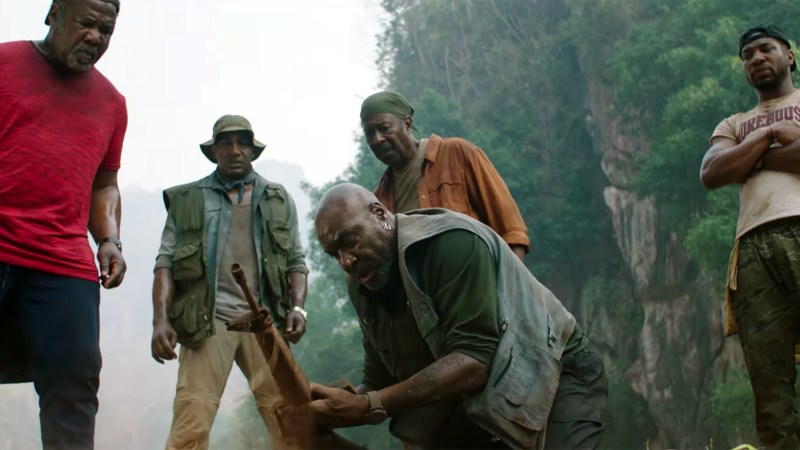Spike Lee’s “Da 5 Bloods” is the most violent anti-violence film imaginable. The emotionally draining, 156-minute epic works because of this dichotomy: the Bloods, who preach the words of the peace-loving Rev. Dr. Martin Luther King Jr., kill with frightening ease and zero hesitation. It’s this contrast that makes “Da 5 Bloods” gripping, thought-provoking and, in typical Spike Lee fashion, scarily relevant.
“Da 5 Bloods” follows four Black Vietnam War veterans as they return to the lush rainforests of Southeast Asia — Otis, the benevolent medic; Eddie, the wealthy peacemaker; Melvin, the sweet, loyal friend; and Paul, the bitter Trump-supporter. Their trek into the forest is driven by their quest to regain two precious things lost in the war: the remains of their fallen leader, Stormin’ Norman, and millions of dollars in buried gold, which they stumbled across in the heat of battle and hid in the hopes of reclaiming it later. What starts out as a joyful reunion between distant friends quickly turns hostile.
Much of that anger comes from Paul (Delroy Lindo), who carries his war memories as heavily as he does the gold bars the men eventually find and fight over. Greed seeps into the relationship among these men, and it turns deadly when Vietnamese gunmen show up demanding a share of the unearthed treasure. What started as a nostalgic trip back to the now-tourist-friendly Vietnam turns dangerous and war-like. Landmines, gunfire, unresolved international conflicts and — most dangerous of all — repressed memories sneak up on the men. Thus ensues a powerful story that proves that the war never really ended.
War scenes make up less than half of the film, but they are beautifully shot, even if they are horrifically bloody. Perhaps Lee’s most inspired cinematic choice is the way he flashes back to the war. Suddenly, the images shrink and the camerawork becomes shaky in a way that mimics televised war footage. If Lee’s mission in including this violence was to translate fear to the viewer, he succeeded, even as the stunning, graphic nature of these shots is often hard to watch through to the end of a scene.
Lee also doesn’t mess with anti-aging technology. In the flashbacks, the four surviving Bloods still have the gray hair and worry lines they arrived with today, despite the fact that they were in their early 20s during the war. Stormin’ Norman (Chadwick Boseman), however, is still the 20-year-old soldier who never got to come home. Though a bit confusing and heavy-handed at first, this almost gimmicky juxtaposition allows us to see how present the war still is for these men, their memories as vivid as real life.
Though Stormin’ Norman appears to be an accessory to the story, he’s ultimately deeper than that. Norman is Lee’s messenger, his way of showing the concurrence of the Vietnam War and the Civil Rights Movement. Otis fondly describes Norman by saying, “He was our Malcolm and our Martin,” encapsulating the central love versus violence struggle that lives in these Black soldiers. When Hanoi Hannah, a subversive North Vietnamese radio announcer, addresses Black soldiers to break the news of King’s death, Lee seamlessly integrates images of King’s funeral and civil rights protests with the devastated young Bloods. Hannah reminds the men of one tragic irony of the Vietnam war: disproportionate numbers of Black Americans are forced to fight for a country that refuses to give them equal rights. The enlightened Bloods momentarily vow to kill white American soldiers rather than Vietnamese until Norman reins them in. “We won’t let nobody use our rage against us,” he says.
This is not the first time Lee has explored the contrast between love and violence; in 1989’s “Do the Right Thing,” Mookie and fellow Bedford-Stuyvesant residents wonder whether they should choose love or “Fight the Power” after a series of racial conflicts in their changing neighborhood. The film ends with a King quote and a Malcolm X quote rolling down the screen. The moments following King’s death in “Da 5 Bloods” complement “Do the Right Thing” perfectly, as the film depicts violent uprisings in protest of the murder of a famously peace-loving man.
“Da 5 Bloods” is also remarkably relevant. Despite being filmed before the death of George Floyd, Lee was prescient enough to include a scene at a Black Lives Matter meeting — one of the five Bloods sends his take of the gold to fund the group’s activism. In Spike Lee’s worldview, Black Americans are still at war, fighting the power just as they did 50 years ago in the jungles of Vietnam.
Contact Sophia Peyser at speyser21 ‘at’ spenceschool.org.
